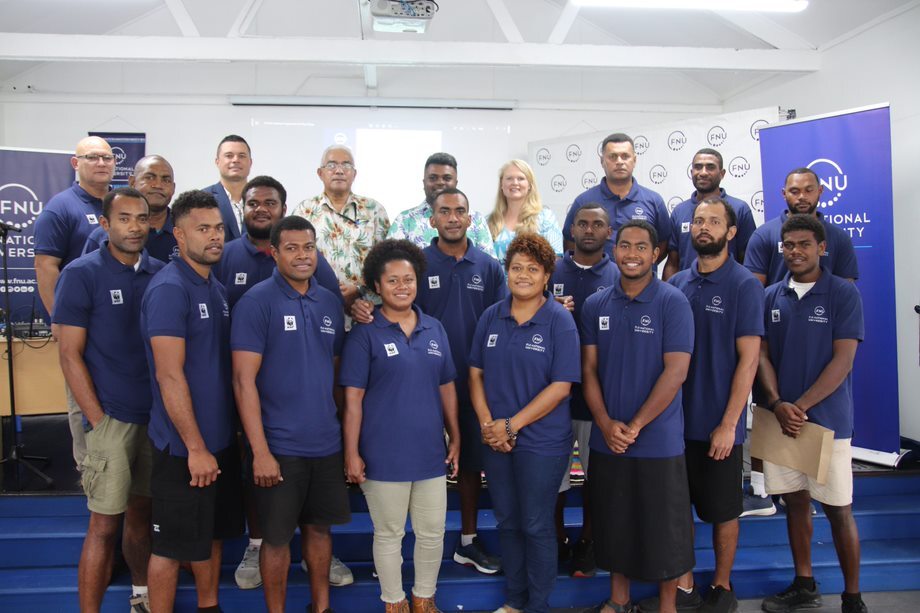

Graduates at the Fiji Maritime Academy Graduation Ceremony.
In a significant milestone for Fiji’s maritime industry, the Fiji National University’s (FNU), Fiji Maritime Academy (FMA) celebrated the successful completion of its Deckhand Fishing Programme as 18 individuals graduated with a comprehensive range of skills.
By addressing the pressing issues of oceanic safety and the protection of marine biodiversity, the FMA has effectively integrated environmental consciousness into the core of its curriculum.
Recognising the importance of making this transformative education accessible to deserving students, the FMA partnered with the Worldwide Fund for Nature (WWF) to provide scholarships. The Academy also engaged the Fiji Fishing Industry Association (FFIA) to provide clear pathways for graduates to pursue their professional careers.
The new graduates are equipped with skill sets obtained over a month-long training programme. This ensured that they not only contribute to the maritime industry, but also to the safety of our oceans and the protection of marine life, particularly sea turtles.
The chief guest for the graduation ceremony and FNU’s FMA Chief Executive Officer, Captain Rajitha Semage, said he was proud to witness the partnership between FMA, WWF and FFIA.
Captain Semage noted that the collaboration continued to add to the growing number of qualified deckhands in the nation’s fishing industry.
“We are immensely proud of our graduates and their accomplishments. The FMA is committed to providing students with the knowledge, skills, and opportunities they need to thrive in the fishing industry”, said Captain Semage.
He added, “through the support of our partners, including WWF, we have been able to equip these graduates with the necessary training to make a positive impact in their careers as fishing deckhands and in the marine environment. These graduates now have the skills and knowledge to mitigate the effects of bycatch in the fishery where they work and to do so safely.”
The FMA’s rigorous programme focussed on providing students with both theoretical knowledge and practical experience in basic sea safety, nautical expertise and effective by-catch mitigation strategies. By addressing the critical issue of by-catch, with a particular emphasis on the impact on sea turtles, the FMA has played a pivotal role in fostering a more sustainable fishing industry.
This ground-breaking initiative, introduced in 2019, was made possible through the partnership between FMA, WWF-Pacific and the FFIA.
As the 16 men and two women graduates embark on their professional journeys, they carry with them the values of environmental consciousness and safety. The new graduates also foster a new generation of maritime professionals who will act as ocean stewards.
The scholarships were made possible through the Safeguarding Nesting Populations of Sea Turtles in Fiji project. This initiative aims to reduce sea turtle bycatch in Fiji. The project, funded by WWF-UK, is a collaboration between WWF-Pacific and the FMA.
The Regional Conservation Director for WWF-Pacific, Hanna Helsingen, highlighted how the role of the new graduates is essential in shaping a more sustainable and responsible future for the fishing industry.
“The support provided by WWF-UK has enabled the provision of scholarships thus allowing educational opportunities and empowering these graduates to contribute to the conservation of sea turtles and marine ecosystems”, said Helsingen.
“This strategic approach aligns with global conservation efforts and industry best practices, setting a new standard for maritime training and as a result, these graduates emerge as ambassadors for responsible fishing practices.”
She added, “their invaluable training ensures that they will carry their acquired knowledge and implement sustainable practices throughout their careers, contributing to the industry’s continued growth and environmental stewardship.”
Since the programme’s inception, FMA has produced over 100 qualified deckhands. This joint effort aims to enhance sustainable fishing practices, reduce bycatch, and address ‘ghost’ gear and marine-based plastic pollution issues.